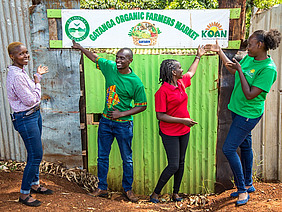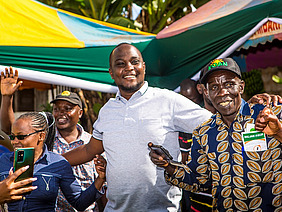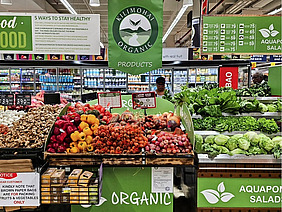Over the past three years, the AOMD project (Accelerating Organic Market Development) in Kenya has pursued two objectives. First, to expand market opportunities for organic farmers by enhancing value chain development and product quality. Second, to strengthen the Kenya Organic Agriculture Network (KOAN) and its institutional capacity. Implemented by FiBL and funded by the Leopold Bachmann Foundation, the project has recently come to a close. The AOMD project strengthened the foundation for sustainable growth of Kenya's organic sector and expanded organic market opportunities in East Africa and beyond.
Building skills, collaboration, and partnerships across East Africa
A major contribution of the AOMD project was its investment in capacity building across a wide range of organic actors in Kenya. Farmers, business groups, market operators, certification bodies, and KOAN staff benefited from targeted training, coaching, and strategic support. Consumers gained important insights about organic food and its various benefits. By supporting trade fair participation and networking, the project also strengthened exporters' international exposure and market connections, improved collaboration with certification bodies, fostered regional partnerships for harmonised standards, and built local government and stakeholder engagement that enabled tangible infrastructure investments.
KOAN was also supported in strengthening its role as a professional, business-oriented service provider. Improved governance, robust financial planning, and strategic alignment with sector needs have positioned it as a credible coordinating body that can serve as a model for organic agriculture. These efforts generated strong interest in the "Kilimohai" organic brand, owned and promoted by KOAN, not only in Kenya but also beyond. National Organic Agriculture Movements (NOAMs) from Tanzania, Uganda, and Rwanda expressed interest in promoting the Kilimohai brand more actively within their countries and positioning it as a regional organic trademark that could strengthen trade and consumer trust in East African organic products.
Diversifying the organic product range
Organic business and market development was another cornerstone of the AOMD project. New farmers' markets were established, and existing ones were strengthened; small and medium enterprises were supported in processing infrastructure, and fourteen new Participatory Guarantee System (PGS) groups were created. PGS are locally-based quality assurance systems for agricultural products.
The Participatory Market Chain Approach (PMCA) enhanced market access, fostered stakeholder collaboration, and promoted product innovation, leading to high-quality value-added products such as dried herbs and spices, avocado oil, orange-fleshed sweet potato flour, cassava flour, mango juice, and dried herbal powder. Through the AOMD project, these products were further supported with processing guidance, equipment, and well-designed marketing concepts and labelling.
In a complementary project funded by the Leopold Bachmann Foundation (2021–2023), FiBL and project partners co-developed and applied the Sustainable Lifestyle Influencing Approach (SuLIA). The approach combined digital storytelling by local content creators with on-the-ground events to create awareness and build consumer trust for the organic Kilimohai brand. These efforts reached over 7.8 million people in Kenya, boosted sales of Kilimohai products across several retailers, and sparked positive conversations on "organic lifestyles".
SuLIA campaigns increased market visibility and strengthened the Kilimohai label, with brand recognition reaching up to 48 percent in some retail outlets.
A legacy for sustainable growth
The AOMD project's integrated approach – combining capacity building, market development, partnership strengthening, and leadership development – has laid a sustainable foundation for Kenya's organic sector.
Alongside the Kilimohai organic "Green Label", the project has initiated discussions on creating a "Blue Kilimohai Label" for agroecological products. While organic certification requires farmers to meet defined standards through a compliance process, the agroecology label is based on assessing the extent to which agroecological principles are applied and how progress evolves over time. The "Blue Kilimohai Label" aims to encourage farmers to adopt agroecological practices and, in the long term, to support their gradual transition to organic farming.
The introduction and use of the "Blue Label" will be part of a new project funded by the Rockefeller Foundation with KOAN leadership and FiBL support. It aims to support a sustainable supply of school meals in Muranga County by sourcing from agroecologically producing smallholder groups under PGS.
Author: Nicoletta Maestrini, FiBL
Further information
Contacts
Links
- fibl.org: The AOMD project in the FiBL project database
- fibl.org: Article "Organic food in Kenya – Digital Future" (835.9 KB)
- youtube.com: Reaching 7.8 million people - How SuLIA is expanding Kenya's organic market through farmfluencer campaigns
- koan.co.ke: KOAN website
- kilimohaikenya.org: Kilimohai Kenya website






